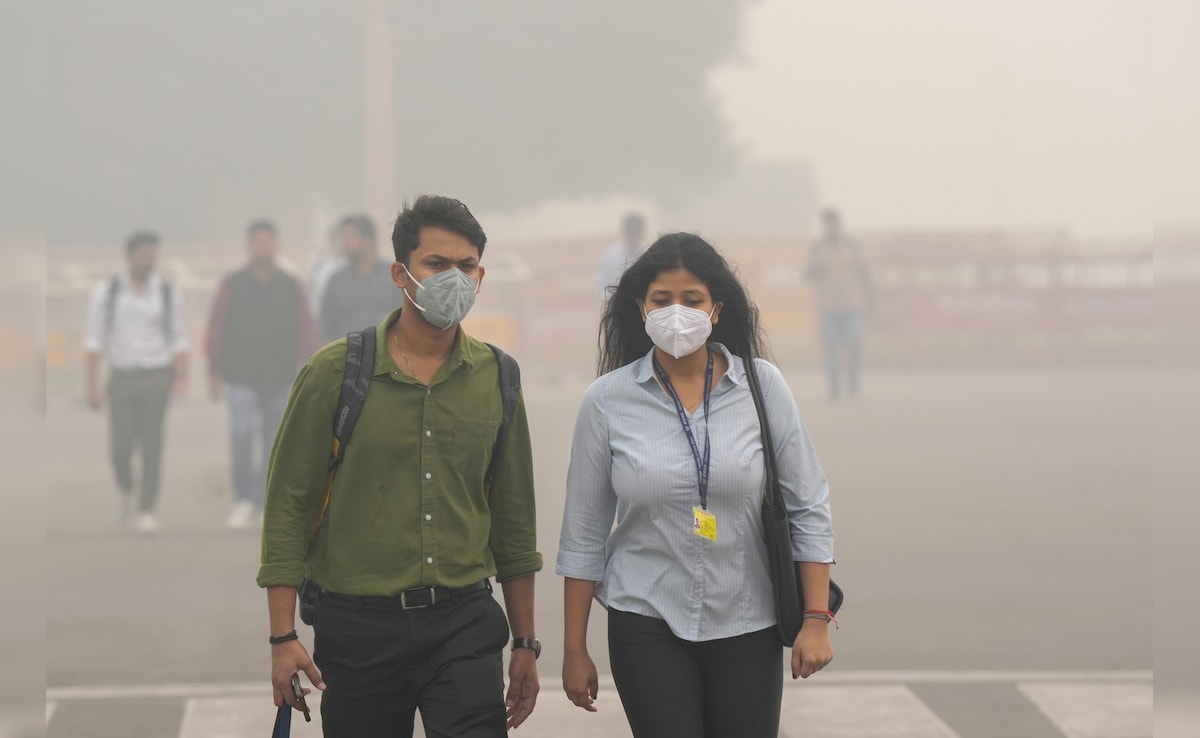- Home/
- 1.5 Million Deaths Between 2009-2019 Linked To Air Pollution In India: Report
1.5 Million Deaths Between 2009-2019 Linked To Air Pollution In India: Report

About a million and a half deaths every year from 2009 to 2019 are potentially linked to long-term exposure to PM2.5 pollution, according to a study published in The Lancet Planetary Health journal.
Researchers, including those at Ashoka University, Haryana, and Centre for Chronic Disease Control, New Delhi, said that the entire 1.4 billion population of India live in areas having PM2.5 levels higher than World Health Organisation-recommended five micrograms per cubic metre yearly average.
The team also found that nearly 82 per cent of India's population, or 1.1 billion, lived in areas with yearly average PM2.5 levels exceeding those recommended by the Indian National Ambient Air Quality Standards (40 microns per cubic metre).
Fine particulate matter, or PM2.5, pollution is caused by particles sized under 2.5 microns in diameter.
A yearly increase in PM2.5 pollution of 10 microns per cubic metre was associated with 8.6 per cent higher annual mortality, the researchers found.
For the study, the authors looked at yearly deaths from 2009 to 2019 at a district level across India and obtained annual PM2.5 concentrations, using data from satellite and over a 1,000 ground-monitoring stations. Deaths data was taken from the Civil Registration System.
The team said that evidence on long-term exposure to air pollution and deaths in India is scarce and inconsistent with studies from other countries.
Exposure to PM2.5 pollution was found to be wide-ranging across the years, with the lowest yearly level noted in Lower Subansiri district, Arunachal Pradesh (11.2 microns per cubic metre) in 2019, and largest yearly level seen in Ghaziabad, Uttar Pradesh, and Delhi (119 microns per cubic metre) in 2016.
(Except for the headline, this story has not been edited by NDTV staff and is published from a syndicated feed.)
also read
Mumbai Pollution Linked To 57% Of Lung Cancer Cases: Maharashtra Government Warns of Health Crisis
Written by Shreya GoswamiInside Bengal's 800-Km "Green Wall" Along Jharkhand Border To Fight Air Pollution
Reported by Rittick MondalUnited Nations Approves First Carbon Credits Under Paris Agreement
Agence France-Presse
Latest Stories
- Written by Shreya Goswami | Friday February 27, 2026
Rising air pollution in Mumbai is now being linked to 57% of lung cancer cases, the Maharashtra government told the state assembly.
- Reported by Rittick Mondal | Thursday February 26, 2026 , Kolkata
The Mamata Banerjee-led government plans to set up an 800-km long greeen corridor, which will work as a "bioshield" - a forested area that would act as a "Green Wall" - along the Jharkhand border to intercept pollutants entering Bengal.
- Agence France-Presse | Thursday February 26, 2026 , Paris
The United Nations announced the approval of the first carbon credits under a global market aimed at reducing emissions, a mechanism that has faced scrutiny over greenwashing concerns.
- Wednesday February 25, 2026 , New Delhi
Air pollution is a concern not just for Mumbai but for countries and cities around the world, Maharashtra Environment Minister Pankaja Munde told NDTV Wednesday, after the city woke this morning to a blanket of smog for an eighth straight day.
- Reported by Radhika Ramaswamy | Thursday February 26, 2026 , Mumbai
Mumbai woke up to yet another blanket of haze on Tuesday morning, with a grey veil hanging over the skyline from Bandra to South Mumbai.
................................ Advertisement ................................
Latest Videos
Opinion
Blog | Well Done, Delhi. You've Turned Lung Sacrifice Into A Badge Of HonourSaikat Kumar Bose
Monday November 10, 2025Till some years back, Delhiites would ask angry questions to those in power about the capitals annual tryst with toxic air. This has changed. Those in the driving seat dont see the need to answer now.
Opinion | Why Indians Have Just Given Up On Air Pollution CrisisTanushree Ganguly
Friday December 20, 2024While some may argue that people in Delhi are now more aware of air pollution than they were a decade back, my rebuttal would be that awareness does not mean that people are concerned.
Opinion | You Must Outrage Over Filthy Air More Than Once A YearJyoti Pande Lavakare
Tuesday December 10, 2024Delhi welcomed us with monsoon rains and mangos. We were home. Fast forward a couple of years, in the winter of 2012, I found myself in denial about something other parents, mostly expats, were calling toxic air.
Opinion | Delhi's Air Pollution Situation Is Like A Bad MarriageNishtha Gautam
Friday November 22, 2024On a good day, such as today, the AQI reading in Delhi is 407. We are jubilant at the sickly sunshine trickling through the slightly dissipated smog. At least its not 1600.
दिवाली... पराली... सियासी जुगाली!Ashwini kumar
Monday November 18, 2024दिल्ली-एनसीआर में प्रदूषण का समाधान तो आज तक मिला नहीं. हर साल चिंतित होकर हम-आप सांसों की तकलीफ के साथ-साथ दिल और ब्लड प्रेशर के मरीज भी क्यों बनें?


















